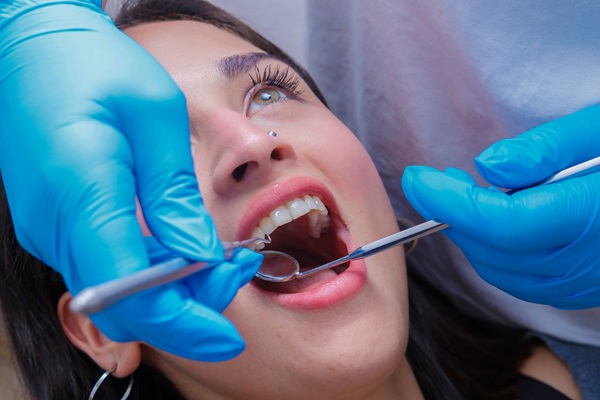7 Oral Hygiene Tips for People With Dentures

Tip #1. Soak Your Dentures Every Night Without Exception
Dentures should be soaked at least once per day or evening. This soaking is necessary to eliminate food, bacteria, plaque and other gunk. The soaking should occur with a nonabrasive denture cleanser. Soaking will also help destroy those germs that cause nasty breath.
Tip #2. Brush Your Dentures Each and Every Day
Dentures should be brushed each day regardless of whether you enjoyed three square meals or a few snacks. Dentures will become stained and develop bacteria and tartar just like regular teeth. Your dentures should be rinsed to remove those pesky pieces of food and brushed with a soft-bristled brush or specialized denture brush.
Use warm water and the appropriate cleaning agent to clean your dentures. Do not use bleaching agents during the cleaning process as they can damage your artificial teeth. Scrub in a gentle manner to prevent scraping.
Tip #3. Eat a Balanced Diet
Choose foods that are easy to chew and swallow. Take small bites and refrain from trying to chew through anything especially hard or sticky. Do not attempt to each uber-crunchy foods until you have had your dentures in for a few weeks. Examples of healthy foods that are easy to eat with dentures include yogurt, eggs, fish, ice cream and cooked vegetables.
Tip #4. You and Your Dentures Need a Break
Take your dentures out at night so your mouth can rest. Sleeping with a newly-liberated mouth will provide your oral tissues with an opportunity to take it easy and heal. This is the chance your gums need to rebound from the irritation, pressure and soreness of the dentures.
Tip #5. Remain Hydrated
You might experience slight to moderate dry mouth when wearing your dentures. This dryness will likely cause your gums and mouth to feel irritated. Dry mouth also heightens the chances of decay caused by bacteria.
Dry mouth can cause significant health issues if it goes untreated long enough. The best way to combat dry mouth is to remain adequately hydrated. The rule of thumb is to consume eight ounces of water each day.
Tip #6. There is no Shame in Avoiding Challenging Foods
If you attempt to eat each and every food following the placement of your dentures, you are setting yourself up for failure. Save those difficult-to-eat foods for weeks or months later. That means you should hold off on corn-on-the-cob, cotton candy, chewy meats and other challenging dishes until at least a few weeks go by.
Tip #. Brush the Entirety of Your Mouth Before Placing Your Dentures
Brush your tongue, cheeks, the roof of your mouth and other portions of your mouth each morning prior to putting your dentures in. Your mouth needs this thorough cleaning to eliminate as much bacteria and plaque as possible. This in-depth cleaning will freshen your breath and set the stage for effective dentures throughout the remainder of the day.
For more information or to schedule an appointment with Family & Cosmetic Dental Design, request an appointment in our Albuquerque dental office here: http://www.albuquerquedentaldesign.com. Or call us at (505) 883-3722.
Recent Posts
For tooth loss, partial dentures are a good treatment option. This appliance not only revives your smile and appearance, but it can have health benefits as well. Your dentures allow you to chew effectively again and eat healthy foods. Replacing missing teeth will also help to prevent additional tooth loss and bone loss. A partial…
A partial denture is a great way to restore not only your smile but also your confidence. This guide will highlight all of the critical aspects of dentures to help you make the best decisions you can.A partial denture is a removable insert in your mouth, filling gaps created by missing teeth with fake replacement…
Dentures are removable, custom-made replacements for lost teeth. If you want your dentures to last for a long time, it is crucial to take care of them. This will help you to avoid a wide range of issues. Keep reading to find out more about proper denture care.There are different types of dentures that are…
Partial dentures are an excellent option for people looking to replace their missing teeth. They may even be good options for people who don’t yet realize it, like those with gum disease or decaying teeth. We will start by explaining how dentures work, then look at when a dentist may consider using them.They are fake…


